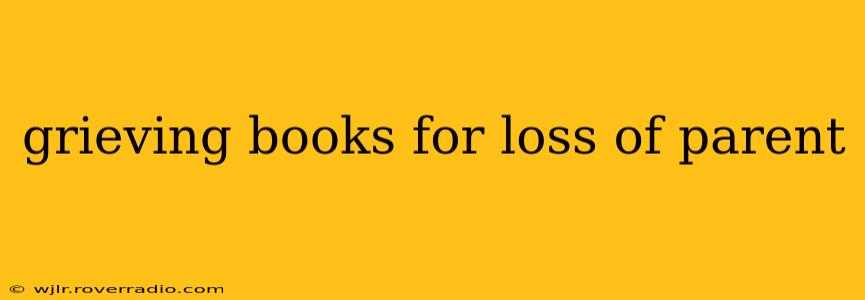Losing a parent is one of life's most profound and challenging experiences. The grief is unique and deeply personal, often leaving individuals feeling lost and overwhelmed. Finding solace and understanding during this difficult time can be incredibly helpful, and turning to literature can offer a powerful sense of connection and validation. This guide explores books that address the complexities of grieving the loss of a parent, offering comfort, insight, and a pathway towards healing.
What are some good books about grief after losing a parent?
Many books explore the nuances of parental loss, offering diverse perspectives and approaches to coping. Some focus on the practical aspects of grief, while others delve into the emotional and spiritual dimensions. The best book for you will depend on your individual needs and preferences. Some highly regarded titles include:
-
"The Grief Recovery Handbook" by John W. James and Russell Friedman: This practical guide offers a step-by-step approach to recovering from the death of a loved one. While not solely focused on parental loss, its techniques are widely applicable and helpful.
-
"It's OK That You're Not OK: Meeting Grief and Loss in a Culture That Doesn't Understand" by Megan Devine: This book provides a compassionate and validating voice for those struggling with grief, particularly those who feel unsupported or misunderstood. It tackles the societal pressures to "get over it" and encourages a gentler, more self-compassionate approach.
-
"When Bad Things Happen to Good People" by Harold S. Kushner: This classic work explores the question of why bad things happen, offering comfort and perspective to those grappling with profound loss. While not exclusively about parental loss, its themes resonate deeply with those experiencing this specific kind of grief.
-
"Option B: Facing Adversity, Building Resilience, and Finding Joy" by Sheryl Sandberg and Adam Grant: This book explores the experience of loss and the importance of building resilience, drawing on Sheryl Sandberg's personal experience of losing her husband. While not specifically about losing a parent, the principles of building resilience and finding joy in the face of adversity are applicable to any significant loss.
What are the stages of grief after losing a parent?
While there's no single, universally accepted sequence of grief stages, the Kübler-Ross model (denial, anger, bargaining, depression, acceptance) is often referenced. It's crucial to remember that grief is not linear; individuals may experience these emotions in different orders, intensities, and durations. There's no "right" way to grieve, and experiencing a range of emotions is entirely normal. Allow yourself to feel whatever you feel without judgment.
How long does grief after the loss of a parent last?
There's no set timeframe for grieving the loss of a parent. Grief is a deeply personal journey, and the duration varies greatly from person to person. Factors influencing the length and intensity of grief include the nature of your relationship with your parent, your personality, your support system, and the circumstances surrounding their death. Be patient with yourself and allow yourself the time you need to heal.
How can I cope with grief after losing a parent?
Coping with grief is a process, not a destination. There’s no one-size-fits-all solution, but here are some strategies that may help:
- Seek support: Talk to friends, family, or a therapist. Sharing your feelings can be incredibly cathartic.
- Allow yourself to grieve: Don't try to suppress your emotions. Allow yourself to feel sadness, anger, or any other emotion that arises.
- Practice self-care: Prioritize your physical and mental health. Engage in activities that bring you comfort and joy.
- Memorialize your parent: Finding ways to honor their memory can be a powerful source of comfort.
- Join a support group: Connecting with others who have experienced similar losses can provide valuable support and understanding.
Are there any books specifically for grieving a mother/father?
While many books on grief address parental loss generally, some focus more specifically on the unique dynamics of losing a mother or father. Look for titles that resonate with your specific experience and the relationship you had with your parent. Searching for books focused on "mother grief" or "father grief" may yield more specific results.
This list is not exhaustive, and many other valuable resources exist. Remember that seeking professional support from a therapist or counselor is always an option, and often a vital one, during this challenging time. Allow yourself the time and space to grieve, and know that healing is possible.
